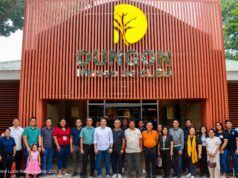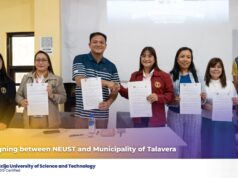SUBIC BAY FREEPORT – The Subic Bay Metropolitan Authority has launched a state-of-the-art vessel traffic management system (VTMS) that will raise the bar of traffic management services of the Port of Subic to eventually qualify as one of the leading ports in the world.
SBMA chairman and administrator Eduardo Jose Aliño said the VTMS will significantly improve port management efficiency as well as the safety and security of the ports inside the Subic Bay Freeport.
He added that the SBMA is currently using a VTMS that was installed as part of the Subic Bay Port Development Project in 2008 which has been in operation for more than 15 years.
“We have proposed and requested funding for the upgrade of the system since 2019. This was approved by the national government under the General Appropriations Act for 2021. In fact, the approved funding for the new VTMS is P270 million,” Aliño disclosed.
The winning bidder for the said project was Northwind Communications and Electronic Incorporated-Xanatos Marine Ltd. with a contract amount of P233- million. A notice to proceed was then issued to the company on June 14, 2022. Senior deputy administrator for port operations Ronnie Yambao said that the new VTMS will provide the SBMA with increased marine radar coverage or vessel tracking and detection, since the current VTMS already has deficiencies and dead spots in the existing radar coverage of the bay.
“A number of areas in the north of Subic Bay, Triboa Bay in the east and areas around and beyond Grande Island have zero radar coverage,” he said, adding that the replacement of radar at the Seaport Building, and the construction and installation of a new radar station at the Ilanin area will broaden the coverage.
The new vehicle tracking system will also include the upgrading and updating of existing hardware and software as the current one is approaching the end of its operational life.
“The new vehicle tracking system hardware is easier to install, operate and configure, is more power efficient than its predecessors, and integrates more efficiently into the software. There have been huge advances in software in recent years and what exists in the market today is far superior to what was in use ten years ago,” he added.
The installation of the new VTMS also included the replacement of VHF and automatic identification system (AIS); replacement of VTMS operator consoles with new VTMS software (computers, microphones, headsets, and speakers);
Installation of monitoring display and printer; provision of database and application servers; and renovation of VTMS operator room and equipment room.
The project also includes the installation of CCTVs at the seaport department, and at the Kalaklan and Ilanin areas to increase visual coverage. Yambao also added that although the radar and AIS coverage provide for the efficient acquisition of targets, visual confirmation is still an important factor in traffic management.
“Visual coverage through installation of CCTV’s will provide operators the ability to track smaller vessels that may not show up on radar. This system will also allow visual confirmation of larger radar targets operating without an AIS,” he said.
The new VTMS will also integrate a port management system that supports the financial aspects of a ship’s visit such as invoicing, and provide information to service providers, terminals, waste collectors, ship chandlers and government.
“This will give way to a better, more improved and seamless port and vessel operations,” Yambao said.





